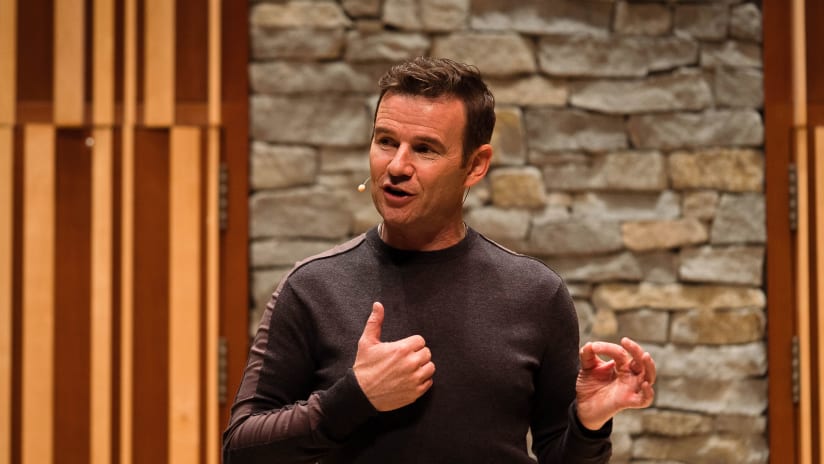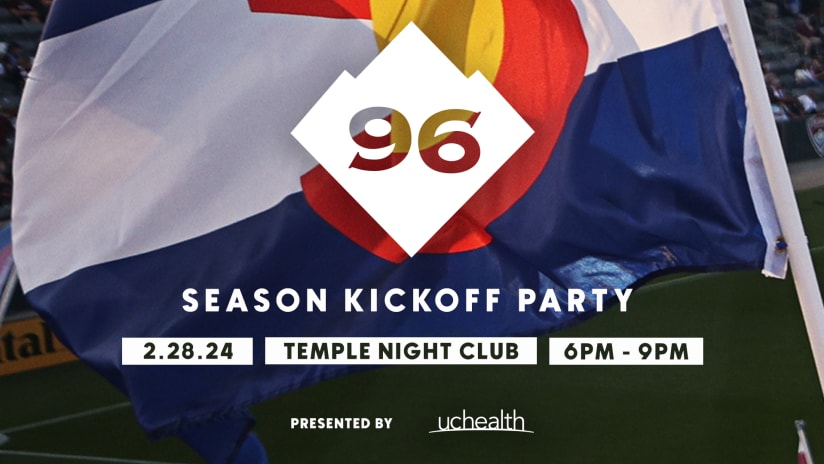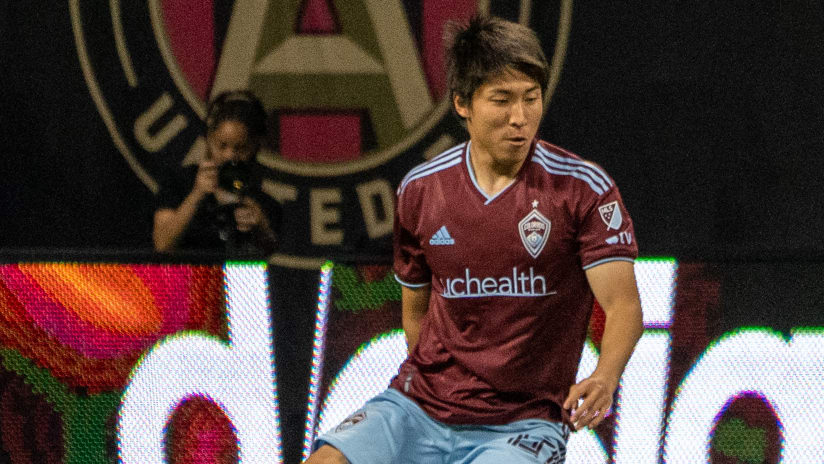As part of Mental Health Awareness Month, we’ll be exploring different aspects of the mental side of sports each Monday in a series titled ‘Mindful Monday’. In our first installment, we were lucky to catch up with inspirational speaker, writer and filmmaker Philip McKernan.
Philip works with entrepreneurs, business leaders and athletes all over the world to help them maximize their potential by focusing on the mental side of their lives and professions. He also works with the first team for the Rapids, which provides a unique insight into how the players and coaching staff are dealing with the current season suspension. We talked to Philip not only about his fascinating work with the players, but we also asked him how fans can approach many of the challenges that are so common during these uncertain times.
ColoradoRapids.com: If you had to boil everything down into a few sentences, how would you describe what you do for the Rapids?
Philip: I would consider myself the mental coach working on the mental and emotional performance within the game and supporting the players on and off the pitch. A lot of the challenges they have in their personal lives outside of the pitch influence their ability to show up and be sharp on the pitch, so that’s an important part of it.
ColoradoRapids.com: The last few months have been unusual to say the least. What’s been your role with the team during this time specifically?
Philip: Despite what people may think, players have personal challenges. Their family or friends might be in isolation, or they might be away from their families. I’ve been working with them, and we try to have some perspective on those challenges, and we try to keep them mentally sharp in their personal lives, so when the season begins to re-emerge they can start working on the playing side of things. Also keeping them match-ready psychologically. Almost preparing as if there is a match on each Saturday, I think that is where they need to keep their minds.
ColoradoRapids.com: You focus heavily on the mental side of the game when speaking with athletes, specifically to make sure they’re ready to be at their absolute peak when they need to be. How have you worked to keep them as sharp as possible with so much down time?
Philip: There’s a few things. I think perspective is an incredibly powerful thing. Sometimes we tend to fall onto the weight of the uncertainty in the world. I interviewed somebody last week from Italy who was sharing a story about a family member that had passed away. They contacted a hospital to ask if it was possible to drive the hearse and the coffin past their apartment. The family wanted to at least look out their window and see the coffin that contained their parent. It’s not to use other people’s tragedies to inspire us, but, to remind us that, yes, we’re locked down and the season has come to an abrupt end, but it’s one of those things that help to keep things in context.
The second thing is to remember what this team can actually do, and the start they had to the season. They’ve had a tough number of years in the past, and there’s a lot of work going on behind the scenes of restructuring the team, bringing in new players, bringing in a great new coach. I think it’s just to remind the players of what this team is capable of doing and to keep that front and center in this very uncertain time.
ColoradoRapids.com: What are some tips or advice that you give the players when they might be in a low spot mentally during this time?
Philip: I’ve worked with the Pentagon and the U.S. Military, and I think they’re one of the best examples of being ready to go into war or into battle. They’re ready to go into some type of defense at any moment. That’s one of the conversations I’ve had with the players. When they wake up on a Monday morning, they are almost mentally preparing for a game on a Wednesday or a game on a Saturday. They almost have to pretend in their own minds that they’re playing a game and then workout accordingly. Also, this idea that it’s what you do when no one is watching that will determine how good you are at anything in life. They’re not being watched right now, like they might be during a training session, so it’s making sure that they’re working out, moving their bodies, conditioning themselves, so when the season does come back, they go into that first training session with a sense of confidence, and they don’t have the guilt associated with the fact that perhaps they took the foot off the gas a little bit.
ColoradoRapids.com: Everyone is missing the community that centers around sports. What are some ways you encourage players and fans to keep that contact with their community and boost their mood until we’re able to get back to playing games in full stadiums?
Philip: One thing that’s really powerful is external validation. When an eight-year-old scores a goal, the first thing he or she does is look to the sideline and say ‘Hey dad, did you see me? Hey mom did you see me?’. They may not say it, but they’re looking for that external recognition. I think it’s a great time for all of us in life to ask ourselves about why we do what we do. And with the players, it’s a great chance for them to stop and actually refocus on their goals and aspirations about why they play the sport. Why they chose to be a professional soccer player. And just to remind themselves. Sometimes they’re playing because when they grew up their dad loved to watch them play, and maybe it’s a time to reimagine why they play the game. We also talk about where they rate themselves as a player on a scale of one to ten. Ten being the best they can be. Then we begin to imagine the things perhaps they can refocus on when they get back into training and to begin to dream about the future three to five years from now. Where do they imagine themselves being? Where do they feel the team is capable of going? So, continuing to dream. When we’re busy we tend not to do these things. We tend to go one foot in front of the other, so it’s a great time to take a step back, look at it from a 20-thousand-foot view down on their career and begin to imagine and reimagine what’s possible for them as a player.
ColoradoRapids.com: Many people, athletes or non-athletes, are feeling uncertain about the future right now. Do you have a simple or easy to remember mantra or exercise that helps to combat the feeling of unease?
Philip: For me, there’s this weird dichotomy where we’re being forced, if we are connecting with people, to do it online. A lot of us have this psychological barrier about social media, about Skype and Zoom. I think we need to get over it a little bit and maybe try things on within the social media platforms that the Rapids are providing and to try things you wouldn’t normally do. For example, when Cole Bassett played FIFA against someone from another team a few weeks back, myself and my son logged on. I found myself going ‘this is kind of ridiculous’ but 20 minutes later I’m screaming and shouting ‘c’mon Cole!’ and he ends up beating the guy. It’s just a fun thing and I felt more connected to the sport. Maybe a bit more connected to Cole, the Rapids. It’s just a simple way to connect. To be fair to the Rapids, they’re doing a lot online in terms of different cooking stuff, workouts and I think it’s more important than ever that we lean into these conversations. During tough times we tend to isolate ourselves. When players are having a tough season, they tend to isolate themselves from the team. That’s the very time we need to be leaning into the conversations. Maybe go back and watch some old games to remind you why you love the game, and why you love football and love sport in general. I’ve also sent a very simple guided meditation that I recorded. It’s the first one I’ve ever recorded. But, essentially, it’s a very simple tool to allow people to connect with what is going on with them emotionally and begin to translate that into some type of broader understanding of why the emotions are oscillating the way they do. So, it’s a guided meditation, it’s a few minutes long if people want to listen to that. Fans can listen to the guided meditation here.
ColoradoRapids.com: There seems to be a lot of people out there talking about picking up new hobbies during this time, learning new skills, finishing that project they’ve always wanted to finish. What would you say to people who maybe aren’t feeling as energetic or that are feeling like they’re just getting by during this time?
Philip: I think people should act with a little bit of compassion here. Compassion is something that’s missing in a lot of people in humanity right now. We give ourselves a hard time. If you’re not feeling up for it, and you’re feeling a lack of energy, then trust that. Maybe you need rest rather than taking up a new hobby. I’d actually be more interested in re-establishing a relationship with something you’ve given up. Perhaps, when you were a kid, you loved art. Rather than taking up a general new hobby that someone recommends, take up something that really excites you. A lot of us tend to give up individual expressions of ourselves and things we enjoy in the pursuit of productivity or money. And when these things don’t necessarily directly earn us money or seem to be hugely productive in society, we don’t put a value on them. I think it’s a great way to nurture ourselves mentally and keep ourselves sharp. I would love for people to consider what they’ve given up and to bring it back into their lives. To try something new – like writing for example – we work with people to write and journal, and it’s just a very simple thing, but it basically opens up new avenues of awareness and understanding about ourselves.
ColoradoRapids.com: May is Mental Health Awareness Month. Why is it important to have a month where this topic is more a part of the public conversation?
Philip: I think it should be Mental Health Awareness Year. I would say in sport, probably 80-90% of it is the mental game. The rest of it is fitness and conditioning and yet, we actually proportionally don’t give enough time and credence and credibility to the emotional side the of the game. Both in life and in sport in general. If you think about the emphasis and the amount of conversation there is about physical and nutritional support – not just for athletes – but life in general with diets etc. We tend to be obsessed about it, and there tends to be this sense of awkwardness and almost a sense of avoidance when it comes to the conversation around the mentality of us as human beings or players. I think most people would agree that the mental side plays a much bigger part. When you become a pro athlete, there’s very little that divides the good from the very best. I think that mental edge is that thing that often sets one player apart from another. So, I would love to see three or five or six months that are mental health awareness related rather than just one month on its own.
ColoradoRapids.com: Do you have any tips for general ways that people can improve their mental health?
Philip: One of the greatest things we can do as human beings is actually to help others. I think at a time when there’s a pandemic, and there’s a lot of uncertainty and a lot of fear, we tend to contract as people. Something my family did in Boulder here in Colorado is we delivered a letter to 30 houses. I’m ashamed to say many of the neighbors we’d never actually met. The letter just said ‘Can we deliver groceries to you? Can we go to the pharmacy for you? Walk your dog?’. It helped us mentally and made us feel stronger and more valuable in our community. I’d love people to try and execute a little bit more compassion in their lives and maybe ask if they were prepared enough for this pandemic. I’d love for people to take the time right now, this down time, to really look at where they’re aligned in their life and where they’re out of alignment in their life. Whether it’s in the work they do or a different aspect. If you want to dive a little bit deeper, maybe look at an area where you need to experience forgiveness externally and internally within yourself. Those things have a huge impact on our mental health on a daily basis.
ColoradoRapids.com: Any parting words of wisdom for Rapids fans?
Philip: Reaching out and helping somebody is powerful. I would also say that they should ask themselves what would it be like to seek help from someone else. We tend to be very prideful or very proud, and we tend to isolate ourselves and not reach out and ask for help, and this a very, very important time to do that. Number two is to move your body as best you can, even if you’re confined to an apartment in Downtown Denver. Use some of the workouts that have been posted to the Rapids social media. Move your body. There’s huge research to show that your physical body and your ability to move it and the frequency you move it has a direct correlation to your overall well-being emotionally and, obviously, physically. Also watch alcohol consumption. Alcohol consumption and sales have gone through the roof in this country, so we tend to turn to alcohol to either subdue or take the edge, and I would actually ask people to do the opposite, which is to actually reduce their alcohol consumption during this time. Really look at the things you can control. You can’t control the virus, you can’t control the economy. Maybe there are things in your life that you are in control of and focus on them, and let go of the need to focus externally. The final piece is to stop watching the news or at least reduce your consumption of news dramatically because the research shows that the news actually keeps us in a state of fear as opposed to relinquishing that or freeing us to be a bit more positive and forward-thinking. And wear your Rapids gear with pride! I’m sitting here with a Rapids t-shirt on right now, and that’s my little homage to the team and to the culture and to the sport, and it keeps me connected.
Rapids fans can find Philip’s books on Amazon. They can learn about his guided meditation here and can watch the documentary he producedhere. For additional information, please check out at PhilipMcKernan.com.




